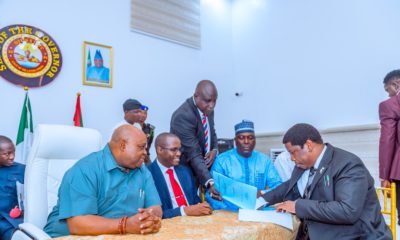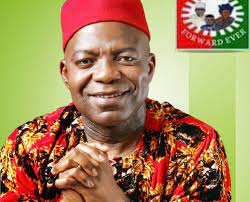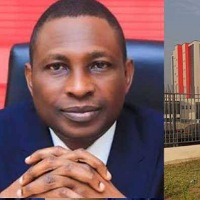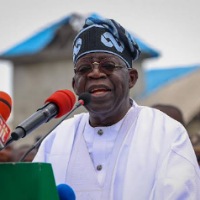NEWS
EFCC, ICPC Chairmen Can’t Come From The Same Zone – Femi Falana
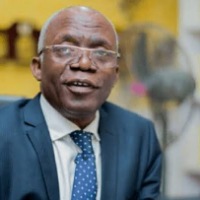
Femi Falana, a Senior Advocate of Nigeria, asserts that having chairmen from the same geopolitical zone for both anti-graft federal agencies goes against the federal character principle.
Falana disclosed this during a live appearance on Channels Television’s Sunrise Daily program on Monday.
He emphasized that to adhere to the federal character principle, if the chairman of the Economic and Financial Crimes Commission (EFCC) is from the northern region, then the southern region should produce the chairman of the Independent Corrupt Practices and Other Related Offences Commission (ICPC).
He stressed, “If you are going to have the EFCC and the ICPC, the heads cannot come from same zone,”
Femi Falana acknowledged that the newly appointed EFCC chairman, Mr Ola Olukoyede, is “eminently qualified” for the role due to his prior positions as Chief of Staff and Secretary to the Commission, along with 22 years of experience.
However, he highlighted that both Olukoyede and the current ICPC Chairman, Prof Bolaji Owasanoye (SAN), being from the South-West geopolitical zone, raises concerns regarding the federal character principle.
BIZTELLERS recalls that President Bola Tinubu appointed Mr. Olukoyede as the new EFCC boss on October 12, 2023, for an initial renewable term of four years, pending Senate confirmation.
This follows the resignation of the embattled ex-EFCC boss, Abdulrasheed Bawa, who was suspended on June 14, 2023, and detained by the Department of State Services (DSS) over serious allegations of abuse of office.
While many lawyers and analysts criticize the appointment of Mr. Olukoyede, contending that he lacks the rank of Assistant Commissioner of Police and thus is unqualified to lead the EFCC, Mr. Falana asserts that Olukoyede is indeed qualified.
Falana points to Olukoyede’s prior high-level roles within the agency as evidence of his suitability for leading the anti-graft commission.
He said “There is no issue; the only issue that has been raised has to be considered by the government is that we have in this country, the Federal Character Commission Act and also by the virtue of Section 14 of the constitution, appointments must reflect Federal Character.
“If you are going to have the EFCC and the ICPC, the heads cannot come from same zone. If there are two positions in the public service, one must go to the North, one must go to the South. If there are four, two must go to the South, two must go to the North. If there are six, one must go to each geopolitical zone. That is the law in Nigeria today.
“So, I am not comfortable with the fact that the heads of the EFCC and the ICPC are from the same zone. Apart from that, Mr Ola Olukoyede, is eminently qualified to head the EFCC. My colleagues who have criticised the appointment have not looked at the relevant provisions of the EFCC which is Section 2.” he added
NEWS
Simon Ekpa’s Arrest Will Restore Peace In South East, Says Enugu Gov’t
The Enugu State Government has commended the Republic of Finland for the arrest of Simon Ekpa, a Finland-based leader of the proscribed separatist group, Autopilots.
Ekpa has been accused of orchestrating violence and chaos in Nigeria’s South East region.
In a statement issued on Friday by the Secretary to the State Government, Prof. Chidiebere Onyia, the government described Ekpa as a “common criminal, con man, and terrorist” who has exploited the Igbo people while claiming to represent their interests.
RELATED NEWS: Finnish Police Arrest Simon Ekpa Over Terror-Related Allegations
“The Enugu State Government welcomes the arrest of the Finland-based terrorist, Simon Ekpa,” the statement read.
“His arrest and trial will no doubt go a long way in strengthening peace, security, and stability in all parts of the South East.”
The state government accused Ekpa of sponsoring violent activities that have resulted in the loss of lives, destruction of property, and disruption of the region’s economic activities.
It stated that Ekpa’s actions were driven by personal greed and not genuine concern for the Igbo people.
Onyia said, “Ekpa is a murderer and fraudster who delights in killing his people and living large off their misery.
“He thrives on manipulating, exploiting, and extorting the people on the pretext of fighting for their interest and for the restoration of Biafra.”
The government emphasized its readiness to provide evidence of Ekpa’s alleged crimes to support his prosecution, whether in Finland or Nigeria.
“This arrest is in line with the demand of the Governor Peter Mbah Administration, which has repeatedly made it known that Ekpa is a megalomaniac, common criminal, murderer, and fraudster who takes joy in feeding fat on the manipulated emotions of Ndigbo and inflicting misery on the South East region,” the statement added.
The government further criticized Ekpa for fostering a climate of fear and insecurity that has harmed the entrepreneurial spirit and economic growth of the Igbo people.
“Ekpa has for long, and unfortunately from Finland, made a living by creating a siege climate and mentality in the South East, destroying lives, property, and the Igbo trademark of entrepreneurship and hard work,” Onyia said.
The Enugu State Government expressed optimism that Ekpa’s arrest would mark a turning point in the quest for peace and stability in the South East, urging residents to remain vigilant and supportive of ongoing efforts to restore normalcy in the region.
NEWS
JUST IN: COP29 Proposes $250bn Annual Climate Finance Target For Developing Nations
The COP29 presidency has unveiled an ambitious climate finance plan, calling on developed nations to provide $250 billion annually to developing countries by 2035.
The proposal, part of a broader initiative to mobilize $1.3 trillion from public and private sources each year, seeks to address the mounting challenges posed by climate change.
The five-page draft text, released on Friday, emphasizes the need for developed nations to lead the charge in financing climate action.
RELATED NEWS: COP29: Climate Summit Faces Deadlock Over Vague Funding Proposals For Vulnerable Nations
According to the document, this financial commitment is seen as a critical step toward combating the climate crisis and fostering sustainable development globally.
“In this context, it is decided to set a goal in extension of the goal referred to in paragraph 53 of decision 1/CP.21, with developed country Parties taking the lead, to USD 250 billion per year by 2035 for developing country Parties for climate action,” the draft states.
The announcement follows the release of an earlier 10-page draft on Thursday, which drew significant criticism from Global South delegations.
Many expressed frustration that the document lacked clear financial commitments from wealthier nations, falling short of expectations to support adaptation and mitigation efforts.
“There is a clear need to address the principle of common but differentiated responsibilities, especially given the diverse circumstances shaping national priorities,” a negotiator from a developing country delegation remarked.
The updated proposal aims to address some of these concerns by outlining more specific targets. However, skepticism remains among some negotiators, who feel the revisions still fail to adequately address their demands.
Meanwhile, developed countries have raised their own reservations about the proposed plan.
A European negotiator, speaking to Reuters, described the $250 billion annual target as unrealistic and criticized the lack of measures to expand the pool of contributing countries.
“No one is comfortable with the number because it’s high, and there’s almost nothing on broadening the contributor base,” the negotiator said.
The mixed reactions underscore the persistent divide between developed and developing nations in climate negotiations.
While the draft text aims to reconcile these differences, the gap between expectations and commitments remains a significant hurdle.
NEWS
Moghalu Prescribes Good Governance As Panacea To Ethnic Agitation

The President of the African School of Governance, Kingsley Chiedu Moghalu has admonished state actors against resorting to brutal force in the bid to muscle out separatist agitators.
In the aftermath of Mazi Simon Ekpa, the Finland based Biafran nationalist agitator being caught in legal web and the Nigerian government moving swiftly to seek his repatriation, the former deputy governor of the Central Bank of Nigeria (CBN) has cautioned that ‘We either fix our problems, or our problems will eventually “fix” us. No alternative to a renegotiated union.’
ALSO READ: Finnish Police Arrest Simon Ekpa Over Terror-Related Allegations
The political economist, while expressing his hope in Nigeria, made it clear that “hope is not a strategy”.
He bared his mind in a series of posts on his verified handle on micro-blogging site, X on Friday.
Moghalu wrote, “Despite sustained contemporary difficulties, I am hopeful about Nigeria. But hope is not a strategy. We need to improve state capacity for effective governance.
“We either fix our problems, or our problems will eventually “fix” us. No alternative to a renegotiated union.
“We must learn to be honest with ourselves and address the root causes of our problems. Why ignore them, when the problem is actually quite solvable? The problem with continuing with this approach is that when the danger crystallizes, those who thought they were benefiting from

